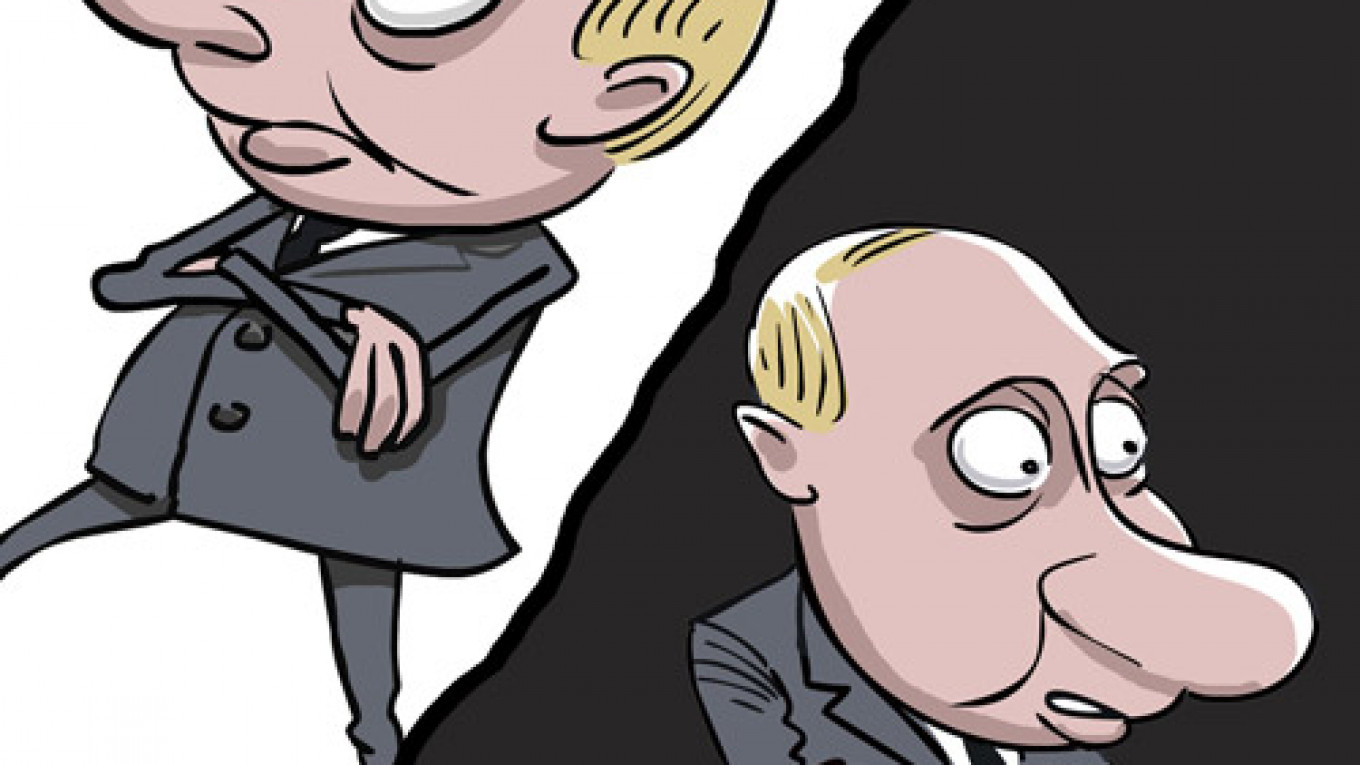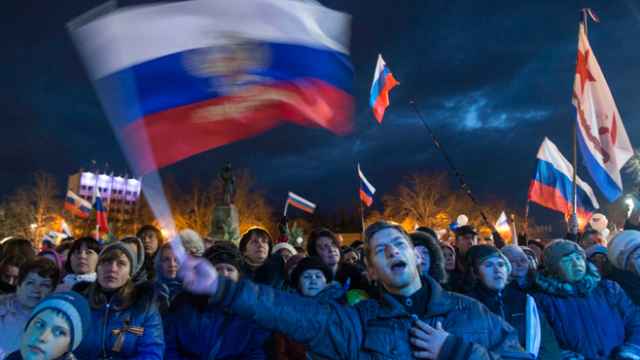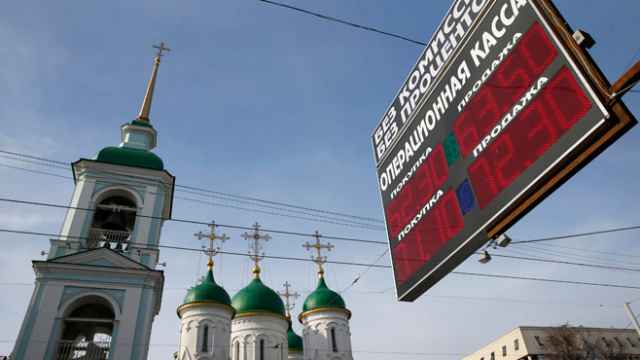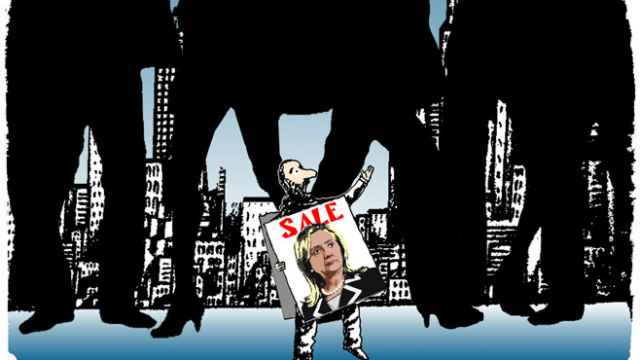President Vladimir Putin has made several appeals to the public in recent months. Both the form and content of those messages are new to the Russian leader's political arsenal. Two films were foremost among those communications: "Crimea —The Way Home" and another, titled simply "President."
Both movies were built largely upon extended and detailed interviews with Putin, along with accompanying interviews with people that did not so much communicate something new as flesh out and corroborate the main points of Putin's message.
Observers speculated that the films represented Putin's attempt to either "send a signal" to the West or else bolster ratings by a few percentage points. Neither theory holds any water. The messages these interviews convey are difficult to translate and deeply connected with the Russian cultural context and the Russian language itself.
Taken out of context and translated into a foreign language, those communiques would do more to confuse a listener than clarify Putin's position. For example, some observers interpreted several phrases in the film "Crimea — The Way Home" as indicating that Putin was threatening to use nuclear weapons.
And the idea that Putin is trying to boost his ratings looks far-fetched considering that he already enjoys record high popularity and that Russians will have nobody else to vote for in the foreseeable future.
Then, in the final days of April, Putin published an article in which he described very personal feelings and memories of his parents and his childhood after World War II. The high point of this chain of events was Putin's heading the ''Immortal Regiment'' on May 9. Together with tens of thousands of people, he marched with the photo of his father along Moscow's streets.
On the one hand, Putin's article about his family's life during wartime and his participation in the Immortal Regiment march probably serve as the logical conclusion to the subjects raised by the previous two films, and, on the other hand, clarify the rationale behind producing those films.
In my opinion, all of this was not so much an attempt to send a signal to the West or earn a few more percentage points in the ratings, but an emotional attempt to bypass the ruling elite and communicate directly with a broad cross section of the Russian population that sees the world much as he does. It represents almost a longing for intimacy.
It is a very sad and touching display. The Russian president seems to yearn for a sincere mutual interchange, even while locking himself away in the Kremlin fortress and refusing to betray even a slightest weakness or shortcoming in any area.
Putin seems to be appealing to the Russian people not to worship or curse him, not to merely use or fear him, but to share their thoughts and emotions with him. He is asking them to take an interest in his life, his personal story, his views and motivations. He wants people to see him as he really is, not the way he appears from the Kremlin podium.
In short, Putin appears to be reaching out for the very things a healthy family life would ordinarily provide. The article, the films, the activities of the All-Russia People's Front, the informal visits to provincial churches during services — all of that is a sort of artificial family, a simulation of family amusements, an attempt to approximate what it feels like to share family stories with the children over the weekend, go to the movies and to live the simple life of an ordinary person.
This man is not "threatening the world," but seeking protection from the world. His desire for family is a self-protective mechanism, and the search for family is the search for safety, security, a way to reduce the pressure and threat, a means for casting off the unbearable weight of authority and to share that burden with truly close family members.
If that is the case, then this is certainly an interesting experiment. No Russian leader has ever genuinely viewed the people of this country as members of an extended family — as tools, yes, or as "worthless clay" from which he could mold them as he pleased — but never as kin. That is a new model.
However, this "family" model might not work so well. The ruling elite cannot feel very happy about seeing their leader ignore them in favor of the Russian people. It turns out that they do not fulfill the role of family members for Putin and that the president must look elsewhere for that connection.
It means that Putin uses them as servants, channels of his political will and top managers, but has no use for them as brothers, children or cousins. That must leave senior officials feeling a bit cheated, like getting handed a cheap tinsel Christmas tree ornament instead of the real thing.
In modern Russia, political considerations have narrowed to the confines of one man's psychological dimensions. It turns out that this man, working alone, is shaping the country's political and social spheres so as to bring comfort to his own mind and heart. This belies the myth that Putin makes his decisions and carries them out with the aid of a modern-day Politburo — the rationale behind targeted Western sanctions against members of the president's inner circle.
The Politburo supposed a sort of collectivism in decision making and implementation. The very act of discussing those decisions in a narrow circle of senior officials tended to lend them certain legitimacy, albeit very limited.
To observers, this "Politburo" resembled a mysterious black box, but it functioned according to particular rules and its own internal logic. It seemed that decisions emerged from a free exchange of opinions and that participants had the right to defend their positions, even against the general secretary.
Such a situation is no longer possible in the Kremlin. Senior officials underscore that Putin alone makes all decisions of any importance. His "manual control" over the government has now become the primary characteristic of his leadership style.
The "we" that Putin pronounces with an easy half-smile does not fool anyone. It is nothing more than a euphemism for "I." And that "I" stands at the increasingly narrow and restricted center of the mindlessly loyal institutions Putin has personally erected over the past 20 years. It is an "I" that addresses itself directly to the Russian public, that perceives the people not so much as part of an extended family as an extension of the president himself.
And as with any "I," it is not based on reason, on external rules, established principles or laws. It stems only from what is inside Putin himself — the pain, loneliness, frustration, memories, experiences, desires and fears. That is powerful stuff — and that internal world easily and often loses all connection with external, objective reality.
Anyone analyzing Russia's politics should understand that they are dealing not with the "ruling elite" or with various "interest groups," but with a single man — with all of his strengths and limitations.
And when they see aggression, it might, in fact, be an attempt to seek protection. And what they see as the unbending will of a world leader might, in fact, be an attempt to step back from a decision and create a comfort zone for himself.
Gleb Kuznetsov is a Moscow-based political commentator.
A Message from The Moscow Times:
Dear readers,
We are facing unprecedented challenges. Russia's Prosecutor General's Office has designated The Moscow Times as an "undesirable" organization, criminalizing our work and putting our staff at risk of prosecution. This follows our earlier unjust labeling as a "foreign agent."
These actions are direct attempts to silence independent journalism in Russia. The authorities claim our work "discredits the decisions of the Russian leadership." We see things differently: we strive to provide accurate, unbiased reporting on Russia.
We, the journalists of The Moscow Times, refuse to be silenced. But to continue our work, we need your help.
Your support, no matter how small, makes a world of difference. If you can, please support us monthly starting from just $2. It's quick to set up, and every contribution makes a significant impact.
By supporting The Moscow Times, you're defending open, independent journalism in the face of repression. Thank you for standing with us.
Remind me later.






